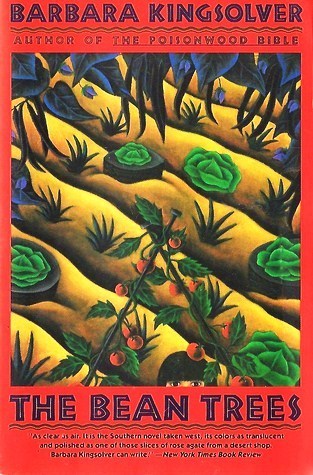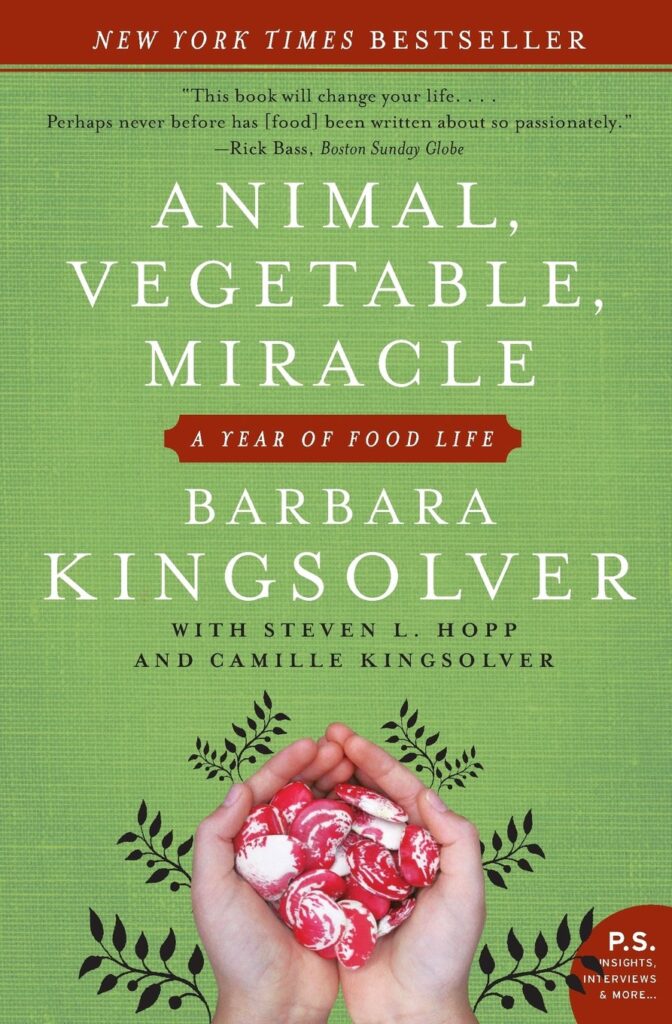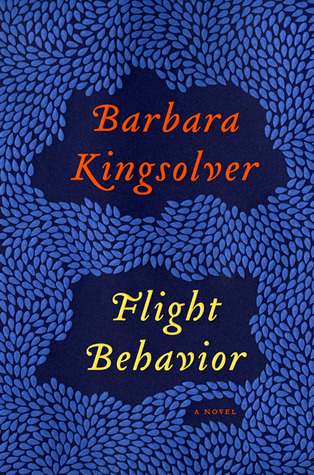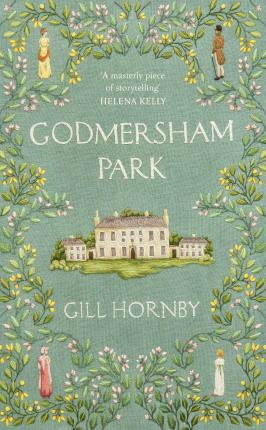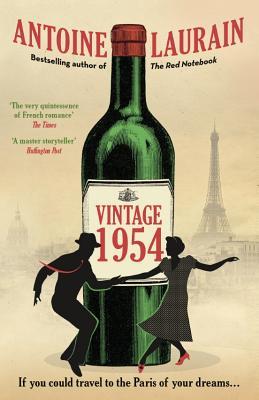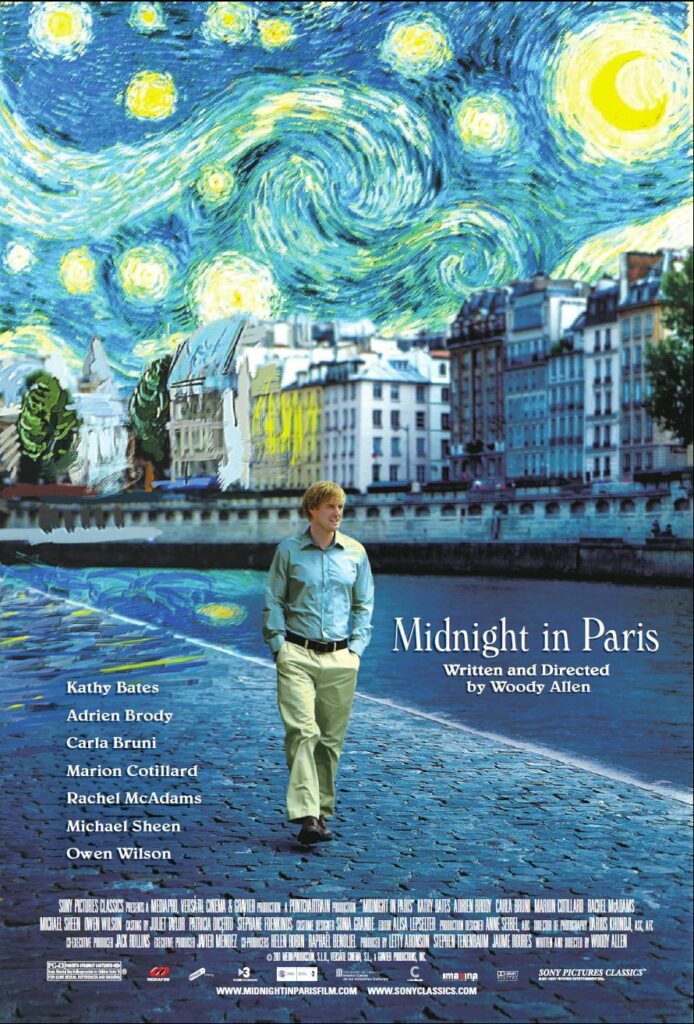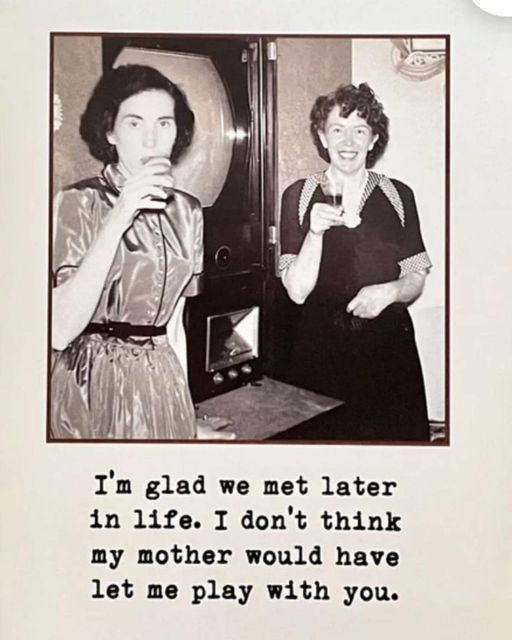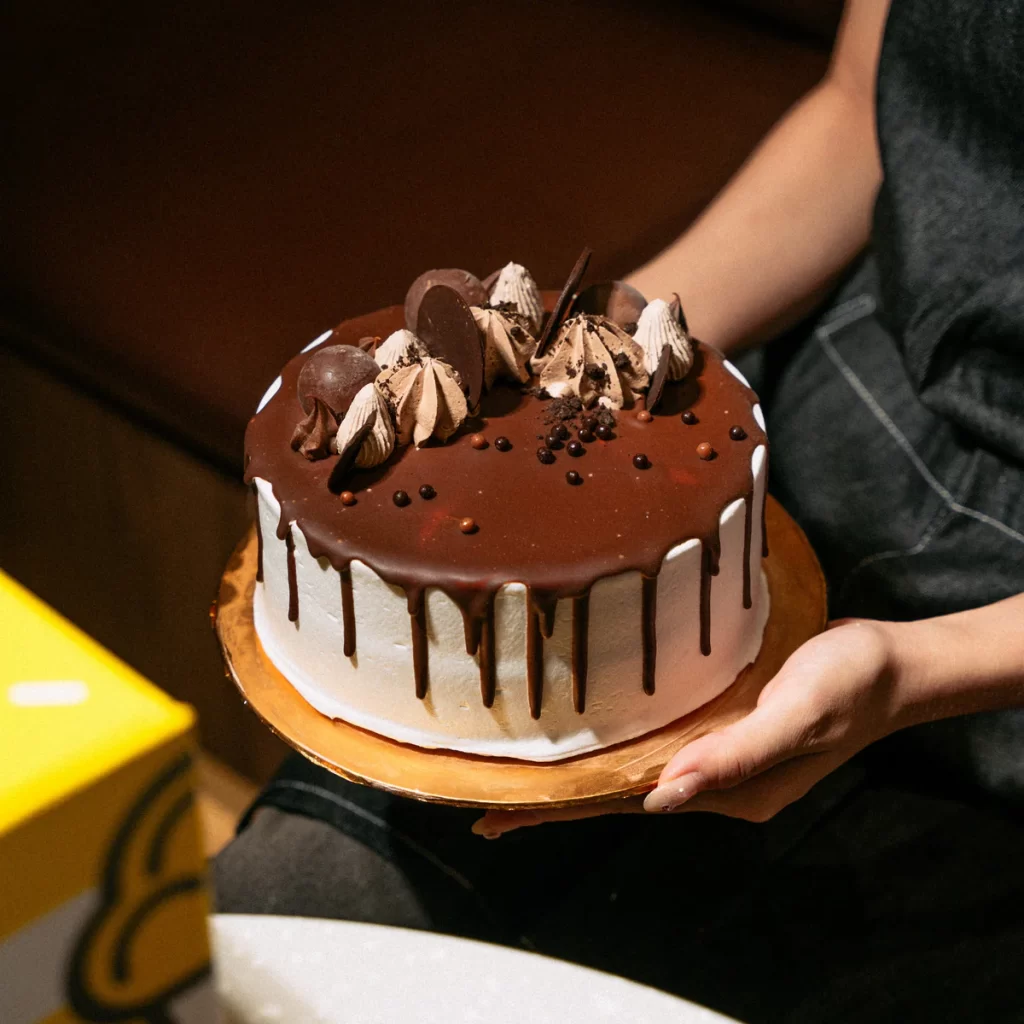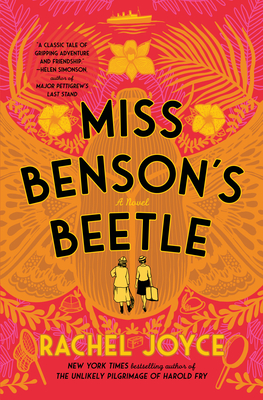A Bookish Proposal
I’m on a mission to find all the Free Little Libraries in my neighborhood, and discovered this one the other day.
Lifted my spirits, made me laugh out loud, and had to share.
Sorry for the terrible photos but it was foggy but with sun at the same time — which made for very odd lighting.
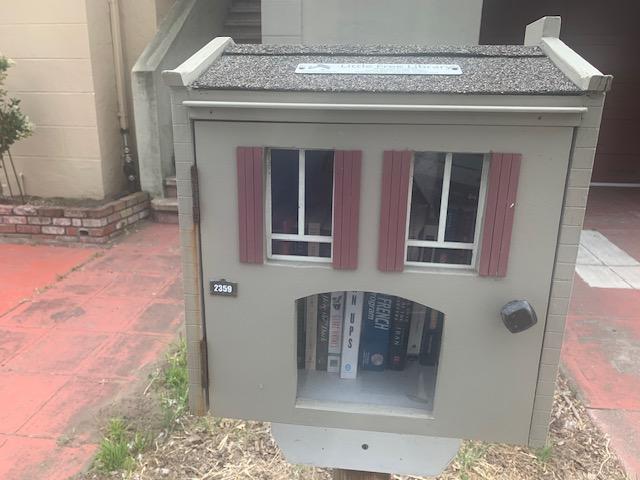

Best proposal ever for a book-lover don’t you agree?
And, the little library is a replica of their actual home. Join me as I say awwwww….
Almost done this – took me awhile to get into it and now I’m hooked.
Will tell you more in a few days when I’m finished…
Barbara Kingsolver
It’s been a moment — my apologies.
I am reading, or rather trying to read, three different books and none of them have grabbed me as yet. And so I flip around from tome to tome hoping to settle into a groove, but so far, nothing. I am not alarmed, this happens sometimes and I know my reading will turn a corner.
In the meantime, a friend and Book Barmy follower asked me about Barbara Kingsolver and had I read her latest, award-winning novel, Demon Copperhead? Alas, I had to reply no, but explained Ms. Kingsolver is is one of my favorite authors. This intrepid reader asked, then why no reviews of her books on your blog?
Say what? I scrolled and searched this blog top to bottom and, she was right, nothing about Ms. Kingsolver anywhere! It’s time to correct this oversight right now.
The Bean Trees
This is Ms. Kingsolver’s debut novel which I read when first published way back in 1988, but its story is still clear in my mind. The Bean Trees tells the story of an improbable heroine named Marietta Greer. Marietta grew up being raised by a single mother in a small town in Kentucky. After high school and working in the town’s small hospital for 5 years, Marietta decides to take a road trip with an eye to settling somewhere else. Along the way, she stops at a diner for dinner. Coming out to her car afterwards, she finds a native American baby wrapped up in a blanket placed on her car seat. The baby’s aunt talks tearfully with her, begging Marietta to take the baby. The baby’s mother is dead and the father seems threatening. Under these circumstances, Marietta reluctantly accepts the baby and drives away. She names the child Turtle and gives herself a new name as well (Taylor).
Together they travel to the outskirts of Tucson, where her car breaks down and they find themselves at an auto repair shop called Jesus Is Lord Used Tires which also happens to be a sanctuary for Central American refugees.
Here Taylor meets a pair pair of elderly ladies who watch over the children and another older woman who rescues Guatemalan refugees. She becomes part of this family of new friends and establishes a sense of home in this new location. It turns out, given her past abuse, Turtle needs all the love and support they can give her.
This is a impactful story of how a nurturing environment lets a child flourish. And at its heart, The Bean Trees is a most memorable novel about love and friendship, abandonment and belonging, and the discovery of surprising connections and heart in apparently empty places.
Pigs in Heaven
The sequel to The Bean Trees continues the story of Turtle and her adoptive mother Taylor. It opens with them living together in Tucson along with Taylor’s boyfriend. It’s a life that is not the most perfect of environments. They barely make ends meet, and although Taylor does her best, her income is limited. But she gives Turtle a great deal of love, and along with her boyfriend, they make up a family. Turtle seems happy, and after years of being mute, she’s learned to talk, and all seems to be going well.
Unfortunately, Cherokee attorney Annawake Fourkiller accidentally discovers the existence of 6-year-old Turtle, and learns that Taylor had illegally adopted Turtle outside the Cherokee nation. Annawake wants to rectify this problem, because she making the case that Turtle needs to be raised by the Cherokee. Taylor, wants to protect her child.
Turtle and Taylor flee their home and the boyfriend in Tucson, and are on the run. They live from motel room to motel room, eating what they can afford. It gets to a point where Taylor does not know what to do next, in fear that she and Turtle will be discovered and eventually Turtle will be taken away from her. Yet, she wonders if what she is doing to Turtle is the right thing to do. When Alice Greer, Taylor’s mother, gets involved, the story takes a surprising turn, and soon Turtle’s biological family gets involved as well. I was glued to the book, wanting to know whether Taylor gets to keep Turtle, or is told to hand over the child to the Cherokee Nation. Pigs in Heaven gives us a fictionalized glimpse into the past and present realities of Native American people.
Prodigal Summer
This is perhaps my favorite of Ms. Kingsolver’s novels. I happened to read it at a difficult time in my life, it captured my complete attention and I struggled to put it down for those pesky things that interrupt reading like working, eating, sleeping.
Prodigal Summer tells the story of three sets of characters living in the Appalachians in Virginia. Ms. Kingsolver gives these stories environmental themes starting with “Predators” which follows Deanna, a Forest Preserve ranger who lives alone in a small cabin high up Zebulon Mountain. She unexpectedly begins a romance with a roaming coyote poacher, although Deanna is working to protect a hidden den of coyotes. Next is “Moth Love” about newly married Lusa and her adjustment to life on her husband’s family farm and the unruly family that comes along with it. Finally there is “Old Chestnuts” which focuses on Garnett and Nannie, two elder folks who have lived next door to each other their whole lives. Their cantankerous relationship eventually arrives at mutual understanding and a unique sense of harmony.
The characters vividly jump off the page, and their stories and voices griped this reader all the way through. There are clear themes running through the book reflecting Ms. Kingsolver’s in depth knowledge of biology, farming, and evolution. The danger of man destroying earth’s creatures because of a domino effect, an exposition on crop insecticides and the devastating results.
Now I’ve just gone and made this book sound boring — but trust me, Prodigal Summer is anything but — it’s quietly gripping and life affirming. I loved the pure joy that shines through the pages. The contagious adoration, for nature — from top predators to insects, to extinct trees and blossoming weeds
A stellar story, a love-song to nature and life. I came away liking coyotes and grieving the American chestnut.
Animal, Vegetable, Miracle
This is a memoir which covers a year in which Ms. Kingsolver and her family spent eating only food they had either grown themselves or purchased from local farmers personally known to them. The author’s skill as a storyteller shines through, and there are some wonderful sections as she relates their adventures plotting how to foist some of their bumper zucchini harvest off on unsuspecting neighbors and how they helped their new turkeys re-learn the lost art of natural copulation.
I learned quite a bit about food and gardening, such as the biological secrets of root vegetables. Her chapter on asparagus helped me understand why the tough, road-hardened variety found in stores is only a pale shadow of an just-picked organically grown stalk. Her description of the succulent morels (almost) made me want to take up mushroom hunting (a high risk venture I fear) and I was greatly impressed on how this mild-mannered novelist “harvests” her chickens at home.
On the down side, Ms. Kingsolver’s memoir is laced with a rather heavy dose of preaching. The first part of this book is particularly thick with commentary on the evils of our current food system. She points out again (and again!) how much better food can taste when it hasn’t been subject to the rigors of corporate food production. More than once, I found myself slogging through sections that left me feeling guilty about some of the food in my kitchen…but, as I kept reading I was inspired to adopt some of her suggestions. Her sweet-potato quesadilla is a regular recipe on our menu and I still have to try her dried-tomato pesto.
Despite the meandering and Ms. Kingsolver’s need to argue every counter-point, I came away impressed and inspired by her strongest narrative: how a renewed connection to food transformed her family and their relationship with the community. By purchasing your neighbors food, you can help with the fossil fuel problem and keep their farm in business. Small yet significant gestures such as buying milk or eggs from the same family in your area keeps them in business and is a huge step in the right direction.
(As I write this we have just returned from out local farmer’s market with some lovely strawberries).
Flight Behavior
Thirteen years ago, this novel tackled climate change – before it became the current crisis we hear about every day. Dellarobia Turnbow a young Appalachian woman, is a restless farm wife who gave up her own plans when she accidentally became pregnant at seventeen. Now, after a decade on a failing farm, she has settled for permanent disappointment but seeks momentary escape through an obsessive flirtation with a younger man. As she hikes up a mountain road behind her house to a secret tryst, she encounters a shocking sight: a silent, forested valley filled with what looks like a lake of fire. She sees it as a sign from God that she should return to the farm and resurrect her marriage.
Actually, what Dellarobia witnessed was a swarm of Monarch butterflies, which normally winter in Mexico, but moved to her small town because of environmental changes. A lepidopterist (don’t you love that word?) comes to study them, and teaches Dellarobia about these butterflies and how the whole population of Monarchs could be in danger of extinction. This highlights her boredom with her husband and her desire for something bigger.
The book is partly a treatise on the dire consequences of climate change, and uses the fictional Feathertown, Appalachian people, as a counterpoint – those who tend to reject scientific explanations for changes in nature, regarding them as God’s will.
Flight Behavior didn’t have a strong plot in the usual sense, but the characters were interesting and the dangers of climate change were boldly drawn. It’s not my favorite of Ms. Kingsolver’s books, but it’s well-written and worth reading.
_____________________________________________
One of the things I most admire about Ms. Kingsolver is how unique her books are from one another. She creates unforgettable, deeply drawn characters in compelling situations, all while delving into varying, and important, cultural and environmental themes. I always come away smarter and impressed — no — wowed by her writing.
I just took a break, because I remembered I had another of Ms. Kingsolver’s novels on my shelf – unread. Maybe this is the book I will finally settle upon.
Miss Austen on PBS
Set your recorders – the Miss Austen series starts on PBS Masterpiece Sunday night.
If you remember, I really got involved in the lovely book. Miss Austen is the untold story of the most important person in Jane’s life — her sister Cassandra and is interwoven with Jane’s brilliantly re-imagined lost letters. You may read more about the book and the storyline HERE.
This PBS adaptation looks very promising – HERE is the trailer.
I have this, by the same author, waiting for me on my shelves. This one is based on a real-life person, Anne Sharp, governess to Jane Austen’s niece from 1804 to 1806, and a close friend to Jane. The details come from a diary kept by the Fanny, Jane’s favorite niece. Should be a fascinating window on the Austen family.
So now you know where I will be Sunday evening with cup of tea in hand — Masterpiece on PBS.
We all may need to start donating to our local PBS stations — based on today’s announcement.
A donation I will happily make, despite the reason.
Vintage 1954 by Antoine Laurain
Full disclosure, I’m in an enticing reading relationship with this French author.
I recently finished another of his — The Reader’s Room, and I enjoyed it so much I immediately checked this one out from the library.
It’s 2017 and Hubert Larnaudie invites some of his neighbors
in his apartment in Paris to share a bottle of 1954 Beaujolais. To his great astonishment, he and three others—porcelain restorer Magalie, bartender Julien, and American visitor Bob—awake the next morning in 1954 Paris.
The four encounter all the fascinations of old Paris—bistros on every corner, fruit and vegetable carts, lampposts, unfiltered cigarettes, and lots of celebrities—and it’s a delightful adventure for them all as they explore the city and their favorite places back in time.
Hubert seeks out his grandfather and learns that his story was rather different to the one told by the family, and he learns something that could be very useful in 2017.
Julien goes to the the famous Harry’s bar where he works in present day 2017 and meets the founder – Harry MacElhone. He then proceeds to impress him and his customers by creating a wonderful new cocktail.
Magalie goes to the haberdashery where she clandestinely buys some thread from the grandmother who had brought her up and who she misses terribly.
Bob explores Paris as he had always intended to do on his holiday, and he is the only one able to exchange money using his American dollars to buy the Francs used in 1954.
They all go and enjoy a visit to the original Les Halles, where handcarts with provisions were the order of the day. Les Halles would be razed to the ground just 14 years later.
It was lovely to move through the city with them, and to spot many notable figures who were in Paris in 1954. I won’t name them all — Salvador Dali Edith Piaf to name a couple — but I must share one other encounter:
Still thinking out how his new cocktail would turn out, Julien paid little attention to the couple who had come in and sat down at the bar. They were discussing the dress the woman would have to wear for the preview of a film in New York. Her elegant companion smiles, ‘Just two more fittings, Audrey, I promise.’
‘I’m counting on you, Hubert. This film is important to me and it’s also important to do justice to your creations,’ replied the young girl in delightfully accented French.
Julien turned to look, and froze. The young girl with the short hair and dark eyes smiled at him and asked, ‘What is that pretty purple drink?’
It turns out that the time-traveling bottle of wine was from a vineyard where, in 1954 a UFO sighting was reported, and the wine had been bottled that summer.
Julien went on. “When the flying saucer flew over, it changed the Saint-Antoine wine and since then whoever drinks it will go back to 1954. It’s been proven by an eminent scientist.”
After meeting this scientist who researched a connection between UFO sightings and time travel, they decided to go back to the vineyard to be there at the exact time of the sighting. While waiting they fish for their dinner in the river that flows through the quiet vineyard (using the thread Magalie had purchased from her grandmother) there is this passage:
The bucolic scene seemed far removed from the city and the world and they all felt as though they had found the essence of life: humans were not meant to sit in an office chair answering emails, or checking their bank accounts on a screen, or reading about world events on their phones. Humans had lived for millennia in nature experiencing its beauty, taming it to take from it the resources needed for survival, as other species did. Building shelter, hunting, fishing, and sewing, they had taken their place in the spherical ecosystem spinning in nothingness that we call Earth. At some point, it had all become rather complicated.
I know, Vintage 1954 requires a large suspension of disbelief, and yes, it’s far-fetched, but M. Laurain creates such fun characters and is such a gifted storyteller, that I hope you’ll forget what you believe and go along for the ride.
(And truly readers, aren’t we already having to suspend belief every day with the news out of Washington?)
I won’t give away the ending, which falls just a bit short. While Vintage 1954 is not perfect, it’s a delightful confection, and just so much darn fun!
My affair with M. Laurain continues with my next read of his, The Red Notebook.
Big shout out and my admiration for the translator, Jane Aitken, her work is seamless — one never feels as if they are reading a translated novel.
Vintage 1954 reminded me of one of my favorite films – Midnight In Paris. Suggested viewing with a glass of normal wine.
Birthday Musings Part Two
Coming off yesterday’s post, I neglected to boast about my loved ones who live far away. They send me birthday cards – but not just your standard ones (not that there’s anything wrong with those)…but special ones that took time and care. Excuse my lousy photos
An very dear artist friend hand drew this card for me.
Look close to see all the little lines and circles — so finely drawn.
Then there is my creative sister-in-law who creates special cards from other recycled cards. What you can’t see, is that they are three-dimensional as she adds little bits and things onto the cards. All done through paper cutting and piecing.
From my very own sister, who combs through card shops each year finding a unique and special card that speaks about sisters and our love for each other. I don’t know how she does it, but I love her for it.
(I’m so lame, that I sent her a birthday card that was a duplicate of one she sent me before…)
A good friend, who moved away from the city several years ago, always remembers my birthday and sent me this card – which made me laugh out loud. It perfectly captures our friendship.
I also got a few lovely e-cards which I sometimes send as well – my favorite e-card site is THIS ONE from the UK. I keep them on my computer to re-visit. And there were birthday Face Book messages and posts as well (yes I still do Face Book…I’m old remember?).
All of these cards and wishes staying with me so I can gaze upon them. With everything going on right now – it’s a wonder any of us can remember our own birthdays let alone others.
Makes me warm and happy to know that those I love who are far away – really aren’t – they are right here.
N.B. I just looked it up and first class postage is now 78 cents – so sending a card is expensive too.
Birthday Musings
I had a big birthday on Saturday. I am 70 years old! How did that happen? I was feeling sort of down about it all, then I read that in French you say J’ai your age or I have my age.
I like that – age is not something you are, it’s something you hold. Something your carry with you like a bag or a book packed with memories and special moments.
We are not defined by, or trapped by an age, we have our age. We own it and have a choice how to live it.
I choose to live mine surrounded by loved ones and simple pleasures — such as my annual flower spending spree at the Flower Mart sponsored by my cute Husband
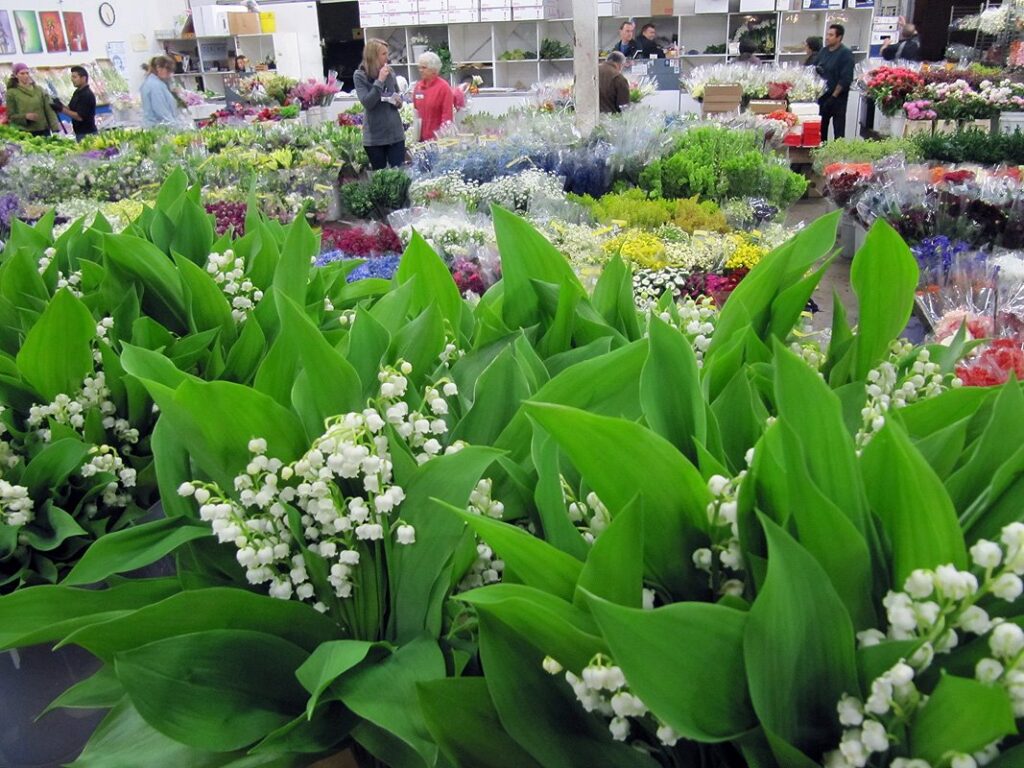
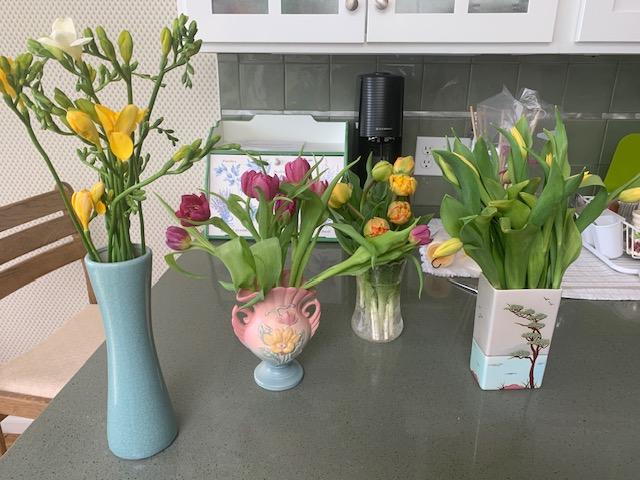
I am also loved by friends who helped me celebrate with lunch and a walk on Valley of the Moon trail in the Sonoma Valley Regional Park. I was able to do three miles with my new knee that day!
Then another celebration at our dear friends’ house, where we ate outside on a beautiful sunny day, ate home made crepes with all the toppings, heard stories from our favorite 9-year old, lots of laughing, and taa-daa — an ice cream cake.
Some new happy memories in to hold and have with becoming 70.
Miss Benson’s Beetle by Rachel Joyce
What a fun read! It starts with this opening line “When Margery was ten, she fell in love with a beetle”.
Marjorie Benson is a large middle-aged spinster — proper, reserved, self-conscious, and both physically and socially awkward. The story begins with Marjorie trying to teach her class of unruly, disruptive girls. They pass around a drawing which makes fun of her appearance. Humiliated, she walks out of the school, but only after stealing a pair of boots.
She decides to fulfill her lifetime dream of finding and proving the existence of a rumored golden beetle in the jungles of the remote New Caledonia Island and to present her discovery to the Natural History Museum. Out of necessity, Margery advertises for an assistant to accompany her to this faraway island. The first two applicants were found unsuitable. A third woman was hired but later backed out.
This left Enid Pretty, dressed in a tight pink suit, wearing pom-pom sandals, and with hair dyed a bright yellow — she also seems quite unsuitable. However, Enid is enthusiastic about the expedition and pleads to be Marjorie’s assistant. She doesn’t even have a passport and knows nothing about beetles, but time is short so Marjorie reluctantly agrees that Enid accompany her on this journey of exploration.
Together these two British women find themselves drawn into a wild and crazy cross-ocean adventure that defies all expectations. Their unlikely friendship builds over time — one step at a time, and is a marvelous tale of the transformative power of friendship.
There are some glorious descriptions of the journey and especially of New Caledonia — you feel like you are hacking through undergrowth with these women as they blaze a trial in search of the elusive golden beetle.
She smelled the sweet air, she heard the orchestra of birds and insects, and far away the ocean; she saw the red flowers like two hands in prayer, the vast kauri trees.
This is not only a wonderful adventure story, it’s also a journey of self-discovery and the freedom of women to rediscover themselves at various seasons of life. Marge and Enid’s friendship allows them to love the best parts of themselves.
The truest friendships are those that allow us to step out of the confines of what we once were, and to realize instead what we might be.
Miss Benson’s Beetle has every ingredient I seek in a novel – adventure, humor, suspense, tension, and moments of beauty – all with wonderful characters experiencing a life changing and exciting new journeys.
An advanced reading copy was kindly provided by The Dial Press via Netgalley.
Ms. Joyce has also written one my favorite books – The Music Shop – also highly recommended.




